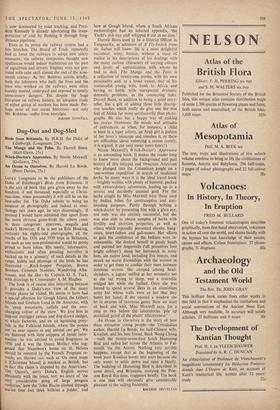Dug-Out and Dog-Sled
Witch-Doctor's Apprentice. By Nicole Maxwell. (Gollancz, 25s.)
LUCKY Longmans to be the publishers of the Duke of Edinburgh's Birds from Britannia. It is the sort of book that gets given away by the hundred, if not thousand, especially at Christ- mas-time, when presumably it will still be on the best-seller list. The Duke admits to being an amateur at photography and indeed at orni- thology (six years ago, he says disarmingly, `if pressed I would have admitted that apart from the more obvious, game-birds the others come In three categories: sparrows, seagulls and ducks'). However, if he is not an Eric Hosking, certainly his eighty-odd photographs, all the results of his 1956 and 1959 trips in Britannia, are such as any non-professional would be pretty proud to have taken. His manly, informative, enthusiastic and often amusing narrative is backed up by a 'glossary' of such details as the range, habits and plumage of the birds he has Illustrated — ,Rock-hopper Penguins, Brown Boobies, Common Noddies, Wandering Alba- trosses, and the like—by Captain G. S. Tuck, with drawings by Commander A. M. Hughes.
The book is of course also interesting because It provides a Duke's-eye view of the many remote places he visited. He seems to have had a special affection for Gough Island, the Gilbert Islands and Graham Land in the Antarctic, with its 'steep mountains, icefalls and the ever- changing colour of the snow.' We join him in dug-out outrigger canoes and dog-drawn sledges, at whale factories, and on an agonising pony- ride in the. Falkland Islands, where the ponies are 'as near square as any animal can get.' We are flattered with little snippets of inside infor- mation—he was advised to avoid Singapore in 1956 and it was the Queen Mother who sug- gested that Napoleon's home on St. Helena should be restored by the French. Pregnant re- !I-larks are thrown out, such as 'On most maps it [Christmas Island) is marked as British, but in fact this claim is disputed by the Americans.' I he Queen's, sorry Duke's, English moves Pleasantly with the times, too; we learn of 'the very considerable pong of large penguin rookeries,' how the 'John Biscoe sloshed through sea-ice four feet thick Without a judder,' and
how at Gough. Island, where , a South African meteorologist had an infected appendix, 'the Yacht's sick-bay staff whipped it out in no time.'
Darrell Bates used to be a District Officer in Tanganyika, as admirers of A Fly-Switch from the Sultan will know. He is a most delightful raconteur, witty, human, without a trace of malice in his descriptions of his dealings with the many curious characters of varying colours and levels of sophistication with whom be had to deal. The Mango and the Palm is a collection of twenty-one stories, with his own personality and, to a lesser extent, that of his resourceful young wife, fresh to Africa and having to battle with unexpected dramatic domestic problems, as the connecting links. Darrell Bates, in addition to being a good story- teller, has a gift of adding those little descrip- tive touches which really do give one the true feel of Africa far more satisfactorily than photo- graphs. He also has a happy way of making his stories illuminate the minds and attitudes of individuals, as when, for instance, a child is born in a leper colony, an Arab girl is jealous of her lover's telescope and smashes it, or there are difficulties about enforcing a census (surely, it is argued, it can only mean more taxes?).
Nicole Maxwell's Witch-Doctor's Apprentice is an astounding book. It makes the reader long to know more about the background and past history of this intrepid and vivacious American who plunged into the Columbian jungle on a `one-woman expedition' in search of medicinal herbs. In many ways it is the ideal travel book —brightly written with plenty of humour, packed with extraordinary adventures, leading up to a serious and decidedly unusual goal. For the herbs sought by Miss Maxwell were those used by Indian tribes for contraceptive and anti- bleeding purposes. Partly through bribing a witch-doctor by presenting him with a glass eye, not only was she entirely successful, but she was also able to obtain samples of herbs with fertility and abortion properties, as well as others which reputedly prevented obesity, hang- overs, heart-failure and gall-stones. Her efforts to gain the confidence of the Indians were in- exhaustible. She decked herself in gaudy beads and painted her fingernails ('all primitives love bright colours'), slung her hammock in noisy huts, ate native food, including live insects, and struck up warm friendships with the women in order to get them to confide their most intimate feminine secrets. She camped among head- shrinkers, a jaguar sniffed at her mosquito net as she lay trying to sleep, and a crocodile nudged her while she bathed. Once she was forced to spend several days in an aluminium army but whose walls were so hot that they burnt her hand; if she opened a window she let in swarms of ravenous gnats. Now we must sit back and wait, Miss Maxwell says, for a year or two before the laboratories 'pile up statistical proof of the plants' effectiveness.'
An Ocean to Ourselves is the story of how three attractive young people--the Trinidadian author, Harold Lit Borde, his half-Chinese wife, Kwailan, and his best friend, Buck Wong Chong —built the twenty-seven-foot ketch Humming Bird and sailed her across the Atlantic to Fal- mouth via the Azores. Nothing very terrible happens, except that at the beginning of the book poor Kwailan bursts into tears because she only wants to settle down and raise a family. The building of Humming Bird is described in some detail, and Britannia, carrying the Prin- cess Royal this time, reappears briefly. The book is one that will obviously give considerable pleasure to the sailing fraternity.
RALEIGH TREVELYAN


































 Previous page
Previous page